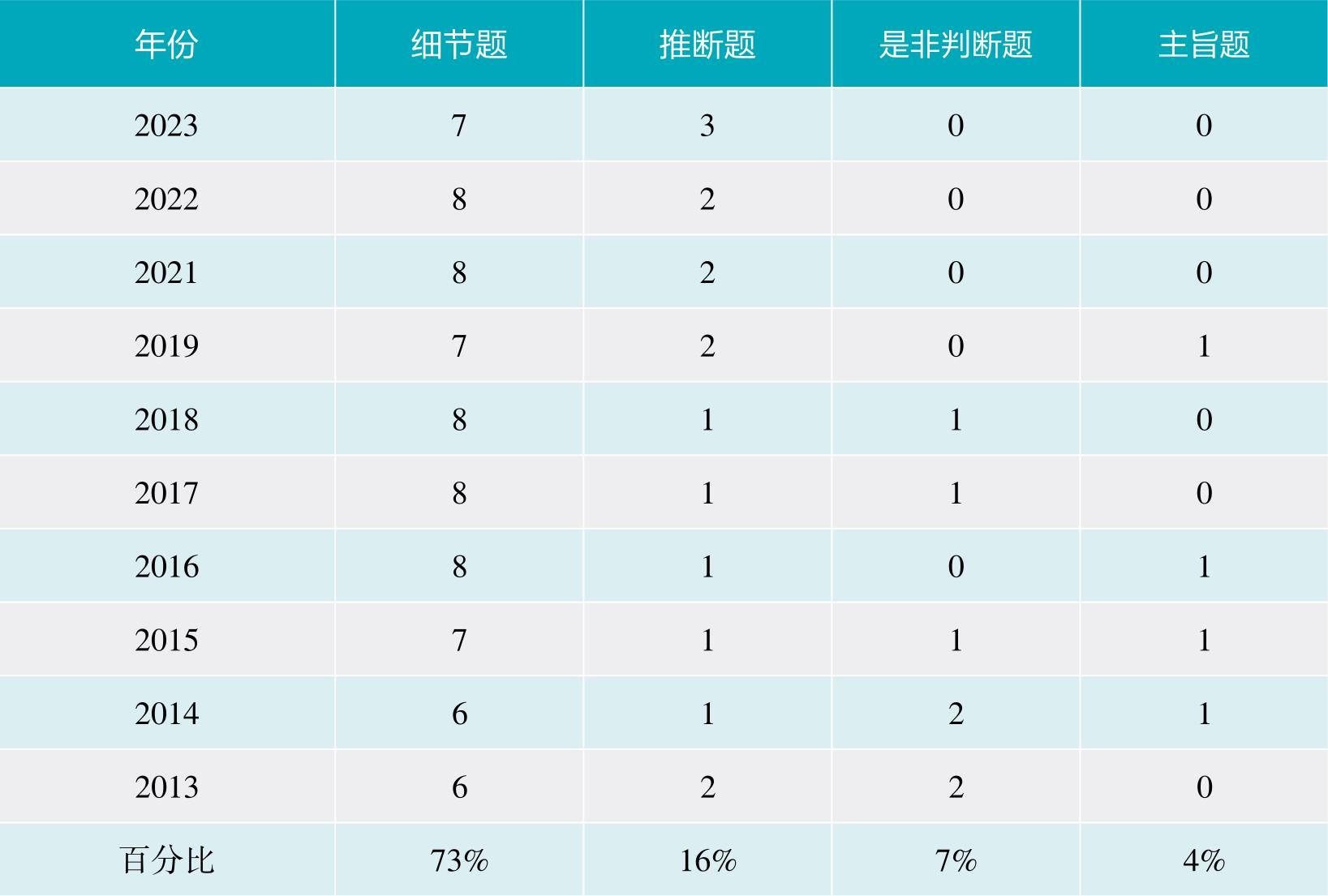




对话题的题干以特殊疑问句的形式出现,改革前有时也会以句子填空形式出现,有四种常考题型——细节题、推断题、是非判断题和主旨题。
其中细节题包括对时间、地点、数字、人物行为以及其他重要细节的考查。
推断题是对观点、态度、人物关系及角色等的推断。
是非判断题既可针对细节设题,也可针对推断内容设题,这类题型多采用排除法解题。
主旨题是对对话中心思想和主题的考查。
专四听力近10年对话题型比例分析

通过对近10年真题对话部分的分析可知:四种题型中,细节题所占的比重最大,为73%;其次为推断题,占16%;是非判断题占7%;主旨题只有在2014年、2015年、2016年和2019年出现过,比较少见。
此类题经常用when或what time提问。对话中可能会出现多处时间状语,听录音时要注意抓住关键词,将时间与事件对号入座。
(2017年第4题)
Q4: When will the service engineer come to fix the computer?
A. By 8:30 tomorrow morning.
B. After 8:30 tomorrow morning.
C. At 8:30 this evening.
D. Anytime tomorrow.
W: Right. Mr. Adams. We'll have an engineer with you early tomorrow morning , and I'll ask him to bring a new hard disk with him. Will you be at home?
M: Yes, but not before 8:30.
【解析】 细节题。题目问:负责售后服务的工程师什么时候去修电脑?对话中女士跟男士说会安排一位工程师明天一大早过去维修男士的电脑,问男士那个时间是否在家。男士回复说“在家,但是不要在八点半之前来”,由此得知,明天上午八点半之后工程师可以去男士家,所以选择B。
此类题经常用where提问,或者以填空题的形式出现。对话中可能会出现多处地点名词,注意抓住关键词,将事件与地点对号入座。
(2015年样题第1题)
Q1: Where is the company which plans a one-way trip to Mars located?
A. Switzerland.
B. England.
C. The Netherlands.
D. New Zealand.
W: You do mean the planet Mars?
M: Well, this is what is being planned at the moment by a company in the Netherlands. They are planning to send people to Mars and the people who go would never be able to come back to Earth.
【解析】 细节题。本题问计划实施去往火星的单程旅行的公司地点。对话中女士问男士:“你的意思是指去火星旅行吗?”男士说:“嗯,现在荷兰的一家公司正在规划此事。”由此可知,计划实施去往火星的单程旅行的公司在荷兰,故答案为C。
此类问题涉及年龄、数量(数值、百分比等)、速度、价格等信息,经常用how many/much提问。对话中一般不会只出现一个数字,因此一定要对出现的数字及相关要点信息进行速记,辨识是针对什么提问的,然后根据记录的信息对号入座。
(2021年第8题)
Q8: How much of the world energy has been used for industry?
A. 75%.
B. 25%.
C. 30%.
D. 45%.
W: Yes, I found some statistics. It's here somewhere…Ah, yes, transportation. That accounts for about a quarter of world energy, quite a bit less than industry, but it's still a significant proportion.
M: And what is the figure for industry, as a matter of interest?
W: That's almost 45%.
【解析】 细节题。题目问:世界上有多少能源已被用于工业?对话中,女士提到交通运输使用了大约四分之一的世界能源,比工业要少。接着男士问女士:“工业的能源用量占比有多少?”女士回答说:“将近45%。”所以本题选D。
此类问题涉及说话者原打算做什么、现在正在做什么、将要做什么等问题。
(2013年第3题)
Q3: Why did Helen come to Rob's house?
A. She wanted to talk to Rob.
B. She had come to help Rob.
C. She had been invited to lunch.
D. She was interested in cooking.
M: Anyway, enough talk. Let's eat!
W: Delicious. Thank you for inviting me.
【解析】 细节题。本题问海伦到罗布家的原因,对话的结尾处罗布说:“好了,不多说了。我们吃饭吧!”海伦说:“食物很美味。谢谢你邀请我来。”由此可知海伦是受罗布的邀请到他家的,故C正确。
此类题考查说话者的观点或态度,题干中经常会出现think、believe、find、guess、imagine、consider等引出观点或态度的动词。表示观点或态度的常见词(组)有:
表示赞成、赞赏:approve、agree、share、admire、prefer、be proud of、reasonable、favorable;
表示批评、反对:criticize、disapprove、disagree、ridiculous、foolish、childish;
表示积极、乐观:positive、optimistic;
表示消极、悲观:negative、pessimistic;
表示不关心、不在乎:indifferent。
(2019年第4题)
Q4: What does the man think of the practice in Italy?
A. It gives women greater equality.
B. It is a good solution to an old problem.
C. The problem troubling feminists still remains.
D. The surname problem has partly been solved.
M: What about the children then?
W: Well, they keep their father's name.
M: So, we're back to the old problem, aren't we? The men win out again?
W: Yeah, but one solution could be for the sons to keep their father's name and the daughter their mother's.
【解析】 推断题。题目问:男士如何看待意大利人的(取名)做法?对话中,男士和女士在谈论孩子的姓氏时,女士说孩子们用父亲的姓氏。随后男士说:“所以,我们回到了之前的问题上,对吧?男性再次胜出了。”由此得知,男士认为困扰女权主义者的问题仍然存在,所以本题选C。
此类题考查对话中说话者的角色或人物关系。
(2019年第6题)
Q6: Who is Janet Smith?
A. A reporter from a weekly program.
B. An executive director from a company.
C. A guest on a weekly program.
D. A magazine editor from San Diego.
M: Welcome to our weekly program. Well, if you want to get a raise at work, but you just don't know how to ask, our next guest has some helpful tips on how to raise your pay by helping you negotiate with the boss. Here's Janet Smith, senior director from DOS Executive Search Firm in San Diego. Hi, Janet. How do we get a raise?
【解析】 推断题。题目问Janet Smith的身份。在对话开头,男士说:“欢迎来到我们每周一期的节目。”由此得知,对话中的人物正在录制一个每周一期的节目。紧接着男士在引出本期节目的主题时,提到our next guest,后面提到了Here's Janet Smith。结合整段内容得知,Janet Smith是节目的嘉宾,故选C。剩余三个选项中,B是最容易错选的,Janet Smith是DOS高管猎头公司的senior director(资深总监),而非executive director(执行董事),故B项排除。
此类题需要采用排除法来判断答案,即根据各选项关键词,逐一定位原文,判断其正确与否。此类题难度较大,要求考生有很强的速记能力。常见的提问方式有:
Which of the following is CORRECT?
Which of the statements about...is INCORRECT?
Which of the following details is NOT correct?
Which of the following is NOT true according to the conversation?
Which statement best describes...?
(2014年第6题)
Q6: Which of the following is NOT true according to the conversation?
A. She recommended people to take classes.
B. She was willing to pay more for classes at home.
C. She left her job immediately after her promotion.
D. She regarded the business as a pastime at first.
M: Did you give up your job, then?
W: No, not immediately. The idea was too scary. I had a good job with a good salary, and starting my own business seemed a bit risky. So I just did it as a hobby, really.
【解析】 是非判断题。题目问:根据对话内容,哪一项说法是不正确的?C项意为“她刚得到晋升,就马上离职了”,这与听力内容不符,因为当男士询问女士是否辞去工作时,女士明确回答说:“不,没有马上(辞职)。”故C项说法错误,答案选C。
主旨题比较少见,只有在2014年、2015年、2016年和2019年出现过。此类题要求考生把握好整篇对话的内容,尤其注意对话的开头和结尾。
(2019年第5题)
Q5: What is the programme mainly about?
A. History of surnames in America.
B. Feminist movement in the 1960s.
C. Traditional surnames in Europe.
D. Reasons for inventing surnames.
...
M: Today, we're going to talk about family names... Susan Writer Wells, it sounds almost invented, doesn't it?
W: Well, you're actually not far off the mark...
...
W: Yeah. Well, her maiden name was Morse, and at that time, I'm talking about the late 1960s, women like my mom were really trying to liberate themselves from male bondage, as they called it. So some of them began rejecting their father's surname and decided to invent their own surname instead. And because my mom was a journalist, she decided to call herself Cindy Writer.
M: Cindy Writer. Well, who would have guessed?
W: Actually, other feminists named themselves after the town where they were born, like the sculptor Judy Boston. Some even called themselves after a day of the week.
...
W: No. But the problem then was what to call herself or rather her children. Anyway, a lot of people of her generation simply decided to add their husband's name to their own. My dad's called Paul Wells, so I'm Susan Writer Wells.
M: So, what would happen if you, Susan Writer Wells, meet some guy who's called Peter Painter Jones? Do you then become Susan Writer Wells Painter Jones? Bit of a mouthful, isn't it?
...
【解析】 主旨题。题目问这个节目主要是关于什么内容。对话开头男士就表明了主题:探讨姓氏问题。然后男士提到,女士的名字Susan Writer Wells听起来像是自创的,对此女士给予肯定回答,并介绍了她母亲那个年代的事情:在当时女权运动的浪潮下,很多女性拒绝使用父亲的姓氏,会自创姓氏。女士讲述了女权主义者自创姓氏的原因和方式。由此可知,自创姓氏这一话题贯穿对话始终,所以选D。